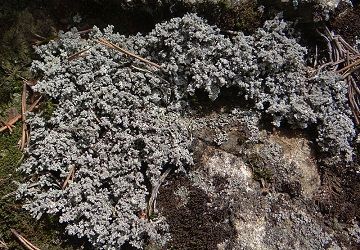Lichen Molecules Could Shape Future Dental Treatments
Researchers have identified a lichen that thrives in subarctic or arctic regions that contains several molecules that fight bacteria. It's possible that these molecules could be used to treat dental issues, such as caries and periodontal disease. Two of the compounds the researchers discovered have never been identified on the planet before. One of the researchers said, Lichens in the North are exposed to unique environmental stresses. We thought that these species might produce special molecules to cope with these very rugged conditions."

Stereocaulon paschale is a lichen species that thrives in arctic and sub-arctic climates. Researchers have identified compounds within this lichen that may help treat cavities and gingivitis in the future. Image Source: Jerzy Opiola via Wikimedia Commons
A specific lichen usually found in subarctic or arctic regions of the world has recently been found to contain several unique molecules, along with antibacterial compounds, that could help in the treatment of dental problems like dental caries and periodontal disease.
The lichen, Stereocaulon paschale, can be found on mountain peaks in Canada in addition to the arctic parts of the planet. The researchers who collected the lichen performed a phytochemical analysis that yielded 11 compounds. Two of these compounds, classified as ascomatic acid dibenzofuran derivatives, included molecules that had never been identified or isolated anywhere else on the planet.
RELATED: More Dental Research Coverage from Sarah Handzel
· Slow Down! Chewing Your Food Could Help Fight Infection
· Alzheimer’s Drug Could Change How Dentists Treat Large Cavities
· Coatings with Antibacterial Properties Being Designed for Dental Implants
The nine other compounds that were isolated have already been identified in other living organisms elsewhere in the world. Further testing of the compounds showed that six of them have potential antibacterial activity against certain pathogens, like Porphyromonas gingivalis and Streptococcus mutans. These two bacteria are already known to cause oral health problems, including dental caries and periodontal disease.
One of the researchers, Normand Voyer, says, “Lichens in the North are exposed to unique environmental stresses. We thought that these species might produce special molecules to cope with these very rugged conditions."
"It's still too early to know whether the two molecules we've discovered have specific properties that could have medical or industrial applications," explains Voyer. "However, the objective of our study was not to provoke a rush to the molecular treasures northern Quebec species may contain. Rather we wanted to demonstrate that there is a hidden wealth of naturally occurring compounds in northern environments that need to be studied and protected.”
Voyer continues, “Numerous phytochemical studies have been carried out in tropical forests, but the North remains largely unexplored. There are surely many other northern species that, like S. paschale, contain unique molecules. We may find the next cancer treatments in these regions. If we do find natural compounds that have useful applications, it will be important to develop methods for synthesizing them in the lab so as not to jeopardize the survival of the species that produce them."